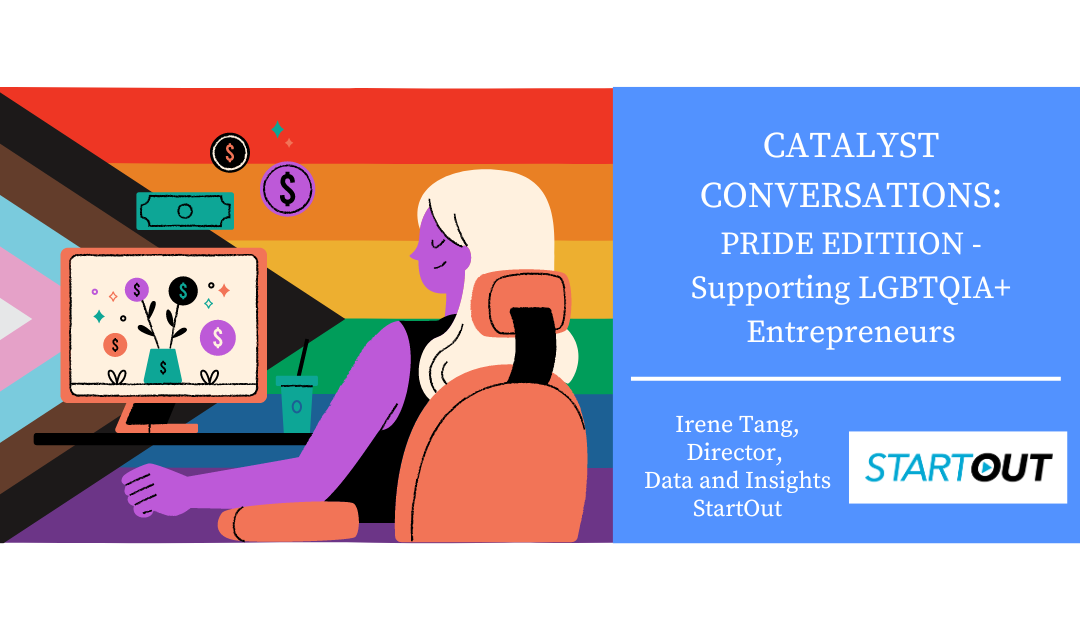CATALYST CONVERSATIONS: PRIDE EDITION – Supporting LGBTQIA+ Entrepreneurs
According to a 2005 study from Syracuse University, being LGBTQIA+ adversely affects a founder’s ability to engage suppliers, obtain licenses, market their businesses, hire employees, and approve loans from commercial banks.
In 2016, StartOut, in collaboration with University of Chicago Booth School of Business, conducted a study, “The State of LGBT Entrepreneurship in the U.S.,” which found that it’s harder for LGBT entrepreneurs to raise money from early-stage angel and venture-capital investors.
We reached out to Irene Tang, Director of Data and Insights at StartOut, who shared their team’s intel on the current challenges that LGBTQ+ entrepreneurs encounter and the opportunities and resources that they provide that are dedicated to accelerating the growth of the LGBTQ+ community to drive its economic empowerment, building a world where every LGBTQ+ entrepreneur has equal access to lead, succeed, and shaping the workforce of the future.

Irene Tang,
Director of Data and Insights
StartOut
Why there is a need for organizations like StartOut who specialize in supporting LGBTQIA+ entrepreneurs?
Of the $2.1 trillion dollars have been invested in startups over the last two decades and only 0.5% go to LGBTQ+ founders while the nationwide LGBTQ+ population stands at 7.1% (Gallup, 2021 for LGBTQ population and StartOut Index for funding percentages).
StartOut is on a mission to build a world where every LGBTQ+ entrepreneur has equal access to lead, succeed and shape the workforce of the future. By providing resources like mentorship, access to capital/investors, and an accelerator program, StartOut is leveling the playing field to empower LGBTQ+ entrepreneurs while driving economic diversity.
What are the biggest challenges queer founders face when starting a business or seeking funding?
According to the 2016 StartOut/Chicago Booth study, almost every LGBTQIA+ entrepreneur has encountered unequal access to key resources needed to advance their business.
LGBTQ business owners can still be denied credit and lending services based on sexual orientation in more than half of U.S. states (Movement Advancement Project. “Equality Maps: Credit Nondiscrimination Laws”, 2023)
Intersectional identities can make it especially hard for queer founders who can also be discriminated against for being a woman, trans, black, hispanic, etc. on top of being out as an LGBTQ person.
Many LGBTQ founders don’t have the benefit of family support as many are still disowned after coming out. (CLEAR, 2023)
“ Investing in LGBTQ+ founded startups offers investors access to an underserved market, diverse perspectives, untapped talent, alignment with social values, early-stage investment opportunities, competitive advantage, and expanded networks.”
What part does mentorship play in the LGBTQIA+ entrepreneur community and what impact have you observed as a result?
Mentorship plays a crucial role in the founder journey and the overall success of any startup. This is especially true for LGBTQ+ founders, who might not traditionally have access to business and high-growth networks that other founders may have.
Mentors can help founders focus their vision, refine their business strategy, troubleshoot core challenges or barriers the founder is facing, and help them identify the pathway to achieving their business goals.
Mentorship also provides niche support on topics like fundraising, marketing, sales, engineering, brand development, scaling, legal, and more. Mentors also have a vast impact on LGBTQ entrepreneurs by way of the introductions they make of the founder to their own business networks, extending their reach and connecting them with people and resources they otherwise might never have access to.
If your interested in learning more about StartOut’s Mentorship program, click HERE.
Tell us about the StartOut Pride Economic Impact Index. What was the motivation behind collecting and curating this data?
The motivation behind the StartOut Index was to show people that there are a lot of members in your community (sometimes people who are discriminated against) that contribute to your area’s success, including your city’s economic development.
StartOut gathered data from a variety of sources. In our analysis of 142K founders and 95K companies that raised at least $250K in funding, we discovered that:
- Only 0.5% of all the funding raised for startups went to LGBTQ entrepreneurs while the nationwide LGBTQ+ population stands at 7.1% according to Gallup Poll.
- We have found that the average LGBTQ+ entrepreneur created more jobs (+36%), patents (+114%), and exits (+44%) with less funding (-16%) as compared with the average entrepreneur.
Although there has been progress in legal protections for LGBTQIA individuals, are there any policies, laws or initiatives that you are supporting to try to provide stronger protection for queer entrepreneurs?
We have studied quite a few non-discrimination policies that we strongly believe would improve the impact and success of queer entrepreneurs.
Of the funding that went to LGBTQ founders, 85% was raised in only 5 metros (San Francisco, New York City, Los Angeles, Austin, and Boston). San Francisco received 6 times more funding than New York and Los Angeles. The cities that perform well have LGBTQ non-discrimination policies. The largest entrepreneurial metros without LGBTQ founders are Orlando (FL), Charlotte (NC), and Birmingham (AL). These metros are located in states without comprehensive non-discrimination policies for LGBTQ people (MAP Research).
We know that sexual orientation is not the only way people identify themselves. Can you talk about the impact that gender and race have on founders’ startup journey?
A Pew Research Study shows 39% of LGBTQ+ adults say that they have been rejected by a member of their family or a close friend as a result of their sexual orientation or gender identity. The reality is that LGBTQ+ people face financial and societal burdens their straight counterparts do not.
BIPOC & LGBTQ+ founders start their fundraising journey from a different place. They often cannot participate in a traditional friends & family raise because oftentimes we lose them upon coming out, or there are barriers to generational wealth that exclude proximity to wealth. Access to capital is critical for all early-stage companies to develop and bring innovative products and services to market, as well as generate jobs. However, access to capital is often a major challenge for underrepresented communities, including the LGBTQ+ community. This lack of access to capital can prevent LGBTQ+ entrepreneurs from starting or growing their businesses, limiting their economic opportunities and potentially contributing to wider economic inequality. This is one of the cornerstones of StartOut’s existence – we work to remove those barriers to promote the economic impact and lasting prosperity of our community.
What is your best advice for investors as they consider funding LGBTQIA+ founded startups?
Investing in LGBTQ+ founded startups offers investors access to an underserved market, diverse perspectives, untapped talent, alignment with social values, early-stage investment opportunities, competitive advantage, and expanded networks. These benefits make investing in LGBTQ+ founded startups a compelling choice for investors seeking financial returns while supporting diversity, equality, and social progress.
Diverse perspectives and innovation: LGBTQ+ entrepreneurs often bring unique perspectives and experiences to their startups, fostering innovation and creativity. Research consistently shows that diverse teams drive better business outcomes, including improved financial performance and increased decision-making capabilities. Investing in LGBTQ+ founded startups brings these diverse perspectives to the forefront, enhancing the potential for market disruption and long-term success.
Access to untapped talent: By funding LGBTQ+ founded startups, investors gain access to a pool of talented individuals who may have faced systemic barriers in traditional employment settings. Many LGBTQ+ entrepreneurs possess exceptional skills, experiences, and insights, which can lead to the development of groundbreaking products and services. Supporting these entrepreneurs provides an opportunity to nurture untapped talent and drive positive social change.
Alignment with social values: Investing in LGBTQ+ founded startups can align with an investor’s social and ethical values. By supporting these businesses, investors contribute to fostering a more inclusive society, promoting diversity and equality. Such investments demonstrate a commitment to corporate social responsibility, which can enhance an investor’s reputation and positively impact their brand.
Early-stage investment opportunities: LGBTQ+ founded startups often face challenges in accessing early-stage capital due to biases and discrimination. As an investor, supporting these entrepreneurs in the early stages can provide opportunities for significant returns on investment as these startups grow and scale. Additionally, being an early-stage investor allows for closer involvement and the potential to shape the direction of the company.
Competitive advantage and market differentiation: Investing in LGBTQ+ founded startups can provide investors with a unique selling point in the market. Companies that prioritize diversity and inclusion, both within their teams and in their customer base, are more likely to attract a diverse range of customers, partners, and employees. This can lead to a competitive advantage in the marketplace and contribute to long-term business success.
Expanded network and partnerships: Supporting LGBTQ+ founded startups can broaden an investor’s network and foster valuable partnerships. LGBTQ+ entrepreneurs often have strong connections within their communities, both locally and nationally. By investing in these startups, investors gain access to these networks, which can open doors to new markets, collaborations, and investment opportunities.

